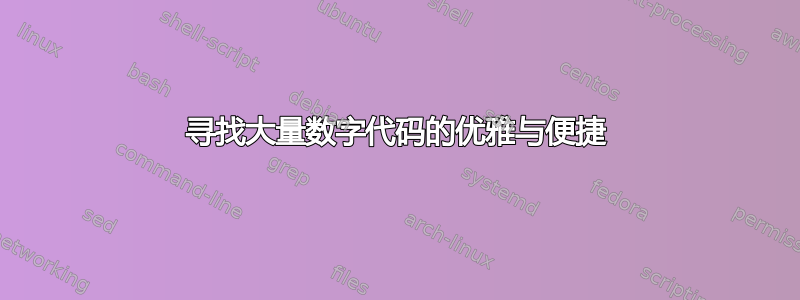
我正在设计tikz在环境中排列的数字图像tabular。每个数字都根据特定样式进行格式化(不同的颜色和形状)。我首先定义每个数字的样式,然后将它们排列在一个tabular环境中。
问题:有没有办法让我的代码更优雅和/或更系统化?
我本来希望能够以 的样式定义数字命令\81,但不知道该怎么做(除了个位数),所以我决定使用\eightyone。然而,现在我想写一个循环遍历数字列表,但“无数字”符号使其变得繁琐。我希望能够处理大量数字。有什么建议吗?
最小示例:编辑:在我的真实世界中,每个数字都有不同的风格,为了简单起见,我将它们全部圈起来并设为绿色。
\documentclass[margin=0pt]{article}%
\usepackage[svgnames,x11names]{xcolor}%
\usepackage{tikz}%
\usepackage{rotating}% provides sideways environment
\begin{document}%
\newcommand{\mycolor}{Brown4!30!DarkGreen}%
\newcommand*\circled[1]{\tikz[baseline=(char.base)]{%
\node[shape = circle, draw, inner sep = 1.8pt, fill = green!30!black!10] (char) {#1};}}%
\newcommand{\eightyone}{\color{\mycolor}{\circled{81}}}%
\newcommand{\eightytwo}{\color{\mycolor}{\circled{82}}}%
\newcommand{\eightythree}{\color{\mycolor}{\circled{83}}}%
\newcommand{\eightyfour}{\color{\mycolor}{\circled{84}}}%
\newcommand{\eightyfive}{\color{\mycolor}{\circled{85}}}%
\newcommand{\eightysix}{\color{\mycolor}{\circled{86}}}%
\newcommand{\eightyseven}{\color{\mycolor}{\circled{87}}}%
\newcommand{\eightyeight}{\color{\mycolor}{\circled{88}}}%
\newcommand{\eightynine}{\color{\mycolor}{\circled{89}}}%
\fontfamily{pzc}\selectfont%
\parindent=0pt%
\begin{tikzpicture}%
\node[anchor = base, inner sep = 0pt, outer sep = 0pt, scale = 6] {%
\begin{sideways}%
\begin{tabular}{ccc}%
\eightyone & \eightytwo & \eightythree \\%
\eightyfour & \eightyfive & \eightysix \\%
\eightyseven & \eightyeight & \eightynine \\%
\end{tabular}%
\end{sideways}%
};%
\end{tikzpicture}%
\end{document}%

另外,顺便问一下,我想让数字稍微居中一些,因为它们目前倾斜得太靠右了。
编辑:如果有人对这些事情感兴趣的话,这里有一个后续内容: Tikz 节点位置和形状以及一般数量的节点
答案1
这是另一个使用 的最小解决方案\foreach。为了清楚起见,我决定将其添加为单独的答案。
\documentclass{article}%
\usepackage[svgnames,x11names]{xcolor}%
\usepackage{tikz}%
\usetikzlibrary{shapes.geometric}
\usepackage{rotating}% provides sideways environment
\tikzset{
81/.style={shape = rectangle, rounded corners=.5em, draw=Brown4!30!DarkGreen, inner sep = 1.8pt,
fill = green!30!black!10,text=Brown4!30!DarkRed,
font=\fontfamily{pzc}\selectfont,align=center
},
82/.style={shape = ellipse, rounded corners=.5em, draw=Brown4!30!DarkGreen, inner sep = 1.8pt,
fill = green!30!black!10,text=Brown4!30!DarkRed,
font=\fontfamily{pzc}\selectfont,align=center
},
83/.style={shape = star, rounded corners=.5em, draw=Brown4!30!DarkGreen, inner sep = 1.8pt,
fill = green!30!black!10,text=Brown4!30!DarkRed,
font=\fontfamily{pzc}\selectfont,align=center
},
84/.style={shape = diamond, rounded corners=.5em, draw=Brown4!30!DarkGreen, inner sep = 1.8pt,
fill = green!30!black!10,text=Brown4!30!DarkRed,
font=\fontfamily{pzc}\selectfont,align=center
}
}
\begin{document}%
\begin{sideways}
\begin{tikzpicture}
\foreach \x/\y/\z in {0/0/81,6/0/82}
\node[anchor = base, inner sep = 0pt, outer sep = 0pt, scale = 6,\z] at (\x,\y) {\z};%
\foreach \x/\y/\z in {0/-5/83,6/-5/84}
\node[anchor = base, inner sep = 0pt, outer sep = 0pt, scale = 6,\z] at (\x,\y) {\z};%
\end{tikzpicture}%
\end{sideways}
\end{document}%

这里你必须自己决定坐标和列数和行数。进一步的即兴发挥留作家庭作业 ;)
答案2
以下是使用 和 的一种matrix方法tikz:
\PassOptionsToPackage{svgnames,x11names}{xcolor}
\documentclass{article}
\usepackage{rotating}
\usepackage{tikz}
\usetikzlibrary{matrix,shapes.geometric}
\begin{document}
\tikzset{
table/.style={
matrix of nodes,
row sep=1ex,
column sep=2ex,
nodes={shape = circle, draw=Brown4!30!DarkGreen, inner sep = 1.8pt,
fill = green!30!black!10,text=Brown4!30!DarkGreen,
font=\fontfamily{pzc}\selectfont,align=center},
},
81/.style={shape = rectangle, rounded corners=.5em, draw=Brown4!30!DarkGreen, inner sep = 1.8pt,
fill = green!30!black!10,text=Brown4!30!DarkRed,
font=\fontfamily{pzc}\selectfont,align=center
},
82/.style={shape = ellipse, rounded corners=.5em, draw=Brown4!30!DarkGreen, inner sep = 1.8pt,
fill = green!30!black!10,text=Brown4!30!DarkRed,
font=\fontfamily{pzc}\selectfont,align=center
},
83/.style={shape = star, rounded corners=.5em, draw=Brown4!30!DarkGreen, inner sep = 1.8pt,
fill = green!30!black!10,text=Brown4!30!DarkRed,
font=\fontfamily{pzc}\selectfont,align=center
}
}
\begin{sideways}
\begin{tikzpicture}
\matrix (mat) [table]
{
|[81]|81 & |[82]|82 & |[83]|83 \\
84 & 85 & 86 \\
86 & 87 & 88 \\
};
\end{tikzpicture}
\end{sideways}
\end{document}



